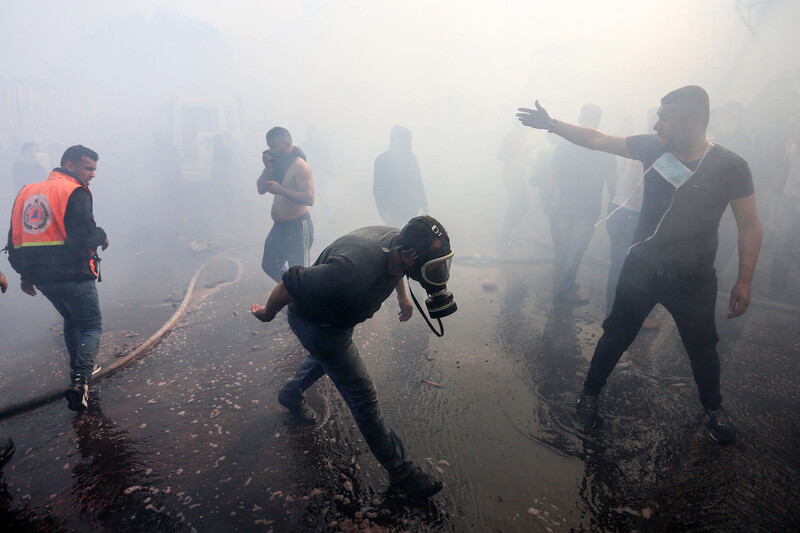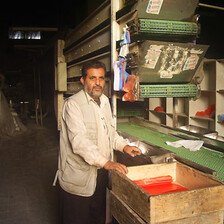The Electronic Intifada 15 September 2020

The Nuseirat market fire ultimately cost 22 people their lives.
APA imagesThe Israeli siege of Gaza affects us in myriad ways.
It is not just about being starved of fuel and electricity, as we have been recently.
Of course, that is bad enough. The vulnerable are even more vulnerable, nights are dark, work is almost impossible to do – if you are lucky enough to have any – and there is no relief from sweltering summers.
But Israel’s blockade is all encompassing. It affects every aspect of our lives here, from our ability to travel and trade, to career prospects, to whether or not we will eat tomorrow.
And it has knock-on effects. Things happen that normally wouldn’t happen.
Things that shouldn’t happen.
In March, a fire broke out in Nuseirat refugee camp that ultimately would take the lives of 22 people.
The fire started in a bakery. It was the result of poor judgement from many local parties.
But while the authorities put the blame on those parties, it is hard to avoid the conclusion that the match that really lit the fire was struck in 2006, when Israel decided that it would punish Palestinians for electing Hamas in parliamentary elections.
Israel had evacuated its illegal settlements in Gaza in 2005, but kept Palestinians in Gaza under tight control, exercising dominion over air, land and sea. When in 2007, Hamas ousted Fatah forces unwilling to abide by the parliamentary election result, Israel simply locked the door.
The resulting blockade and hardships suffered as a result in Gaza have been well documented. The warning from the UN that the siege would render Gaza uninhabitable by this year has also received wide coverage.
Another shortage
We are still here, and we are still surviving. We survive Israel’s bombs, we survive the COVID-19 pandemic.
We survive the absence of basic human needs.
But survive is all we do, and then only just. And sometimes, like in March, death will have us, whatever we do.
In March, Gaza was suffering a severe gas shortage after more than a month in which less gas than usual was imported into Gaza from Egypt and Israel.
Even before these shortages occurred, the amount of gas Gaza imports only covers about half the needs of the area, according to Nour al-Khozandar of Gaza’s petroleum and gas station owners’ association. The amount of gas available at any given time can vary.
Thus, Gaza’s merchants and traders are now primed to expect the unexpected. Osama al-Banna, 50, the owner of a bakery in the middle of the Nuseirat camp’s market, decided to buy extra gas to ensure the continued operation of his shop in view of the gas shortage in March.
He stored it, all 2 tons, in an empty plot of land behind the bakery.
The bakery was one of the main bakeries in the Nuseirat market. It employed 30 people, most of them with families to support.
Osama al-Banna used cooking gas to fuel generators to power the bakery because it couldn’t depend on Gaza’s scant and unreliable electricity supply, also a result of the Israeli siege.
His precaution at first paid off. Out of some 70 bakeries across Gaza, 30 had to close temporarily, according to Abdel Nasser al-Ajrami, who heads a bakeries’ association, because of the gas shortage.
But Osama’s bakery continued to work throughout that period.
Then, on 5 March, the gas canisters exploded.
The fire
Samed al-Rai, 30, was selling children’s clothes from a wooden cart he had parked near the bakery.
“When we heard the explosion, we thought it was an Israeli bombardment. People started running here and there. Then the fire began spreading from the back of the bakery.”
After three minutes, another stronger explosion occurred, and the fire started to spread to nearby stores and other display carts like al-Rai’s.
“We were surrounded by fire. I froze. I just sat on the floor, shocked, watching children and women running and crying.”
Yasser al-Banna works with his brother Osama in the bakery. When the first explosion occurred, he called his brother.
Osama was there within a matter of minutes.
“Once Osama arrived, he poured a bucket of water on himself and ran towards the flaming bakery,” Yasser, 47, said. “He wanted to save his workers.”
But Osama could neither save himself nor his employees.
Five of his colleagues died there and then. Osama, suffering severe burns and smoke inhalation, passed away after four days.
An official investigation into the fire announced its results 11 days later.
In all, 22 people lost their lives, some immediately and some, like Osama, of injuries sustained during the fire. Forty-nine people were injured.
Materially there was damage to 30 shops, 40 display carts and 18 vehicles.
Among the casualties were Iman Abu Mahrouq, 26, and her two daughters Liyan and Manal Hussein, 5 and 3 respectively, the youngest victims.
The investigating committee laid most of the responsibility on the bakery itself for storing too much gas in one place and doing so unsafely.
But there was plenty of blame to go around. Head of the committee, Muhammad al-Nahal said investigators recommended the permanent shutdown of the bakery as well as the gas station that supplied the gas tanks – which investigators found were faulty and from which gas had leaked.
In addition, the local municipality and the civil defense department were castigated for not following proper safety procedures and the committee recommended that the heads of both be removed from their positions.
“I lost everything”
However, Yasser al-Banna said there was a more basic and fundamental cause: the blockade.
“If we did not suffer from a shortage, my brother would not have thought about storing gas.”
It took some four hours to put out the fire, which spread to an area the size of a football stadium.
The civil defense department needed the help of private construction companies and their heavy duty vehicles.
“Our staff is well-trained, but what happened in the market was bigger than our modest capabilities can handle,” said Raed al-Dahshan of the civil defense department operations in Nuseirat.
The fire further intensified when it reached a carpentry workshop near the bakery. There too the owner, Khader al-Rozzy, had stocked up to ride through any shortages of wood and fuel he would encounter.
He had stored 18 gas cylinders, which all exploded.
Khader said he had followed all safety procedures and had just taken receipt of a batch of wood of different types a few days before the fire.
“I followed all the safety and security procedures. I kept fire extinguishers in the workshop, there were sprinklers in the ceiling. There was even a well to draw water from in case of fire,” Khader told The Electronic Intifada.
However, none of the precautions helped against a fire that had spread from elsewhere. Khader’s 25 year-old-son, Ibrahim, was working in the shop at the time and was killed.
“I lost everything,” said Khader.
Israel the culprit
The blockade Israel has imposed on Gaza means it opens and closes crossings – for people and goods – at will. It allows only certain products into Gaza, slapping a prohibition on goods it considers of potential “dual use.”
“Dual use” theoretically means items that could have military applications. But Israel interprets the phrase to cover everything from fuel through castor oil to X-ray machines. Cranes and other heavy equipment are on the list alongside wooden planks.
The approach is punitive. Israel shuts down the supply of goods like fuel, like it did for most of August and some of September, when it wants to hurt Palestinians in Gaza.
Thus, while local authorities blamed the merchants, everyone else blames Israel. Simply put, there would have been no need to stock up on gas if there was no closure.
Similarly, 24 children who died because their dwellings caught on fire from candles lit during electricity shutdowns between 2010 and 2016 might also still be alive.
How many would have been saved had we been allowed to import what we need to fix our sewage system? Sanitize water? Operate a fully functioning health service?
Yes, a baker stocked up too much gas in what turned out to be unsafe canisters sold him by a gas station owner who could not replace old ones.
But these deaths and countless others lie squarely at the door of Israel.
In Gaza, we learn to survive, however we can. But we have no security.
Our lives hang by a thread to which Israel holds a scissor.
Hamza Abu Eltarabesh is a journalist based in Gaza.





